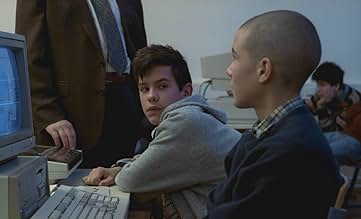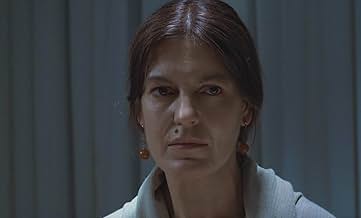CALIFICACIÓN DE IMDb
7.1/10
20 k
TU CALIFICACIÓN
Un videoaficionado de 14 años está tan atrapado en la fantasía del cine que ya no puede relacionarse con el mundo real, hasta tal punto que comete un asesinato y graba una confesión ante una... Leer todoUn videoaficionado de 14 años está tan atrapado en la fantasía del cine que ya no puede relacionarse con el mundo real, hasta tal punto que comete un asesinato y graba una confesión ante una cámara para sus padres.Un videoaficionado de 14 años está tan atrapado en la fantasía del cine que ya no puede relacionarse con el mundo real, hasta tal punto que comete un asesinato y graba una confesión ante una cámara para sus padres.
- Dirección
- Guionista
- Elenco
- Premios
- 2 premios ganados y 3 nominaciones en total
Imelda Marcos
- Self
- (material de archivo)
- (sin créditos)
Hans Meiser
- Self
- (material de archivo)
- (sin créditos)
Brigitte Reimann
- Self
- (material de archivo)
- (sin créditos)
Martin Schoendeling
- Sales manager in videostore
- (sin créditos)
- Dirección
- Guionista
- Todo el elenco y el equipo
- Producción, taquilla y más en IMDbPro
Opiniones destacadas
'Benny's Video' is a genuinely unsettling film whose premise concerns a scene that is particularly disturbing and visceral. The film concentrates on Benny, a seemingly sociopathic teenager, and his regimented, staid parents known simply as 'Mother' and 'Father'. Benny lives a materially charmed life, having an array of electronics bought for him by his affluent middle class parents. This technology allows him to indulge in his interest, or rather obsession, with videos, both watching and recording them.
The film's message is a relevant one, it suggests that the media has a detrimental, and in this case fatal, desensitising effect. However, it suggests this in a rather hyperbolic fashion. The film loses its credibility through how explicitly and rather insularly it conveys its message. In my opinion, it's clear that Benny is a warped individual with an innate lack of remorse, no film or news report can rid someone of their senses to the point of sociopathy. Benny is a contemptible person, and he's purposely constructed that way, but he isn't someone who's the product of desensitisation; his cold, empathy devoid persona is that of a genealogically tarnished mind.
Narratively speaking, the film's first hour or so engrosses you with its unpleasantness and realism. The film places the viewer in a 'what if?' situation that's somewhat reminiscent of films such as 'Deliverance', but it isn't as resonant owing to the abhorrence of the film's events, the psychopathy of Benny and the steely reserve of his parents. During the last 40 minutes of the film, there is something of a pacing problem, I felt the film lost the edge and tension it had created; this isn't a particularly pressing issue, but the film certainly felt longer than 105 minutes.
I found 'Benny's Video' to be a fundamentally flawed film; it would've worked if it had a more balanced, rational message at its core. Some lobbyists, in the haze of their ignorance and typically political agendas, would vehemently agree with this film. I am of the opinion that there is a substantial difference between watching something and doing something. Violent media can, at the very most, be a mere substitutional factor amongst many factors that could somewhat exacerbate the pace of an unhinged, unwell mind.
The film's message is a relevant one, it suggests that the media has a detrimental, and in this case fatal, desensitising effect. However, it suggests this in a rather hyperbolic fashion. The film loses its credibility through how explicitly and rather insularly it conveys its message. In my opinion, it's clear that Benny is a warped individual with an innate lack of remorse, no film or news report can rid someone of their senses to the point of sociopathy. Benny is a contemptible person, and he's purposely constructed that way, but he isn't someone who's the product of desensitisation; his cold, empathy devoid persona is that of a genealogically tarnished mind.
Narratively speaking, the film's first hour or so engrosses you with its unpleasantness and realism. The film places the viewer in a 'what if?' situation that's somewhat reminiscent of films such as 'Deliverance', but it isn't as resonant owing to the abhorrence of the film's events, the psychopathy of Benny and the steely reserve of his parents. During the last 40 minutes of the film, there is something of a pacing problem, I felt the film lost the edge and tension it had created; this isn't a particularly pressing issue, but the film certainly felt longer than 105 minutes.
I found 'Benny's Video' to be a fundamentally flawed film; it would've worked if it had a more balanced, rational message at its core. Some lobbyists, in the haze of their ignorance and typically political agendas, would vehemently agree with this film. I am of the opinion that there is a substantial difference between watching something and doing something. Violent media can, at the very most, be a mere substitutional factor amongst many factors that could somewhat exacerbate the pace of an unhinged, unwell mind.
From its opening sequence, the film immerses us in Benny's world, an adolescent who lives through the images he captures with his handycam and what he watches on television. These images, where reality, media, and fantasy blend without clear boundaries, shape his perception of the world: saturated with spectacles, chaotic, and lacking deep understanding.
The plot gradually reveals that this apparent visual chaos conceals something far darker and macabre. Benny receives an advanced video camera from his parents, a gift intended to compensate for the lack of affection in his upbringing. However, this present becomes a tool that allows him to emotionally isolate himself and create his own world through the lens, disconnecting even more from his family and social environment.
Haneke's cold, clinical style enhances this disconnection, with slow-paced direction that emphasizes unsettling details, like Benny's manipulation of recordings. This approach leads us to a profound examination of the influence of media on the perception of reality, the normalization of violence, and the emotional impact it has on the youth.
A key symbol in the narrative is the video of the pig's slaughter, recorded by Benny. This repeated act not only desensitizes him to violence but also reinforces the notion that, for him, reality turns into a spectacle that can be controlled, edited, and replayed at will.
The film raises essential questions about the boundaries between reality and fiction, the responsibility of parents in the emotional formation of their children, and how media and technology shape our behavior and perception of the world. Although the story was conceived in another era, it eerily anticipates our present, where life seems not to exist unless it's captured on camera or posted on social media.
The plot gradually reveals that this apparent visual chaos conceals something far darker and macabre. Benny receives an advanced video camera from his parents, a gift intended to compensate for the lack of affection in his upbringing. However, this present becomes a tool that allows him to emotionally isolate himself and create his own world through the lens, disconnecting even more from his family and social environment.
Haneke's cold, clinical style enhances this disconnection, with slow-paced direction that emphasizes unsettling details, like Benny's manipulation of recordings. This approach leads us to a profound examination of the influence of media on the perception of reality, the normalization of violence, and the emotional impact it has on the youth.
A key symbol in the narrative is the video of the pig's slaughter, recorded by Benny. This repeated act not only desensitizes him to violence but also reinforces the notion that, for him, reality turns into a spectacle that can be controlled, edited, and replayed at will.
The film raises essential questions about the boundaries between reality and fiction, the responsibility of parents in the emotional formation of their children, and how media and technology shape our behavior and perception of the world. Although the story was conceived in another era, it eerily anticipates our present, where life seems not to exist unless it's captured on camera or posted on social media.
In his second film of the "glaciation trilogy", Haneke once more hauntingly draws a torpid affluent society where the people live at cross purposes, where conservations are rare and toilsome, where communication is alienated to a technical process. Accordingly to that, the emotional life of the protagonists became stunted: Benny, after his "act", shows concernment only through surrogate actions, just like letting his hair cropped. The father immediately slyly pushes to damage mitigation, whereas only the mother indicates rudiments of emotion, though somehow tense. In a confusing blend of film and video images, Haneke creates a second level of reality, so to speak, where Benny's senseless "act" perfectly integrates in the horror pictures of the evening news and makes it open for question. At the same time, Haneke commits himself to no specific answer and denies any absolution. That is what makes this film so horrifying - there simply is no telling argument that makes a murderer out of a young boy.
"Benny's Video" focuses on a maladjusted teenager who is obsessed with technology, particularly video recording and television. He is largely ignored by his upper-class parents who feed his obsession by arming him with the latest and greatest technology, until mom and dad are forced to confront a shocking act of violence he commits.
For anyone who knows Michael Haneke's filmography even on a tertiary level, they will be aware of his bleak depictions of society and frank, unembellished representations of human depravity. This earlier work from the director has his trademarks all over it, and is bolstered by strong performances from Arno Frisch as the disturbed Benny, with Angela Winkler and Ulrich Mühe giving disturbing and calculated performances as his emotionally detached parents.
While the film gets off to a rather startling beginning, some will find the midsection and conclusion to be a bit slow; although they may be correct in pointing out slight pacing issues, the latter part of the film allows the character dynamics between parent and child (and parent and parent) to be expanded upon, and what is perhaps most shocking about it is that the audience grows to develop some sympathy for Benny despite his sociopathy; his parents, less so. There is also a notable contemplation of technology and its function in society that underpins the screenplay.
All in all, "Benny's Video" is an effective, disturbing film that speaks more to the brokenness of the family unit than it does of the malignant outcomes that may arise from it. Certainly not for the lighthearted, but it offers a drab and uncompromising window into the dark. 8/10.
For anyone who knows Michael Haneke's filmography even on a tertiary level, they will be aware of his bleak depictions of society and frank, unembellished representations of human depravity. This earlier work from the director has his trademarks all over it, and is bolstered by strong performances from Arno Frisch as the disturbed Benny, with Angela Winkler and Ulrich Mühe giving disturbing and calculated performances as his emotionally detached parents.
While the film gets off to a rather startling beginning, some will find the midsection and conclusion to be a bit slow; although they may be correct in pointing out slight pacing issues, the latter part of the film allows the character dynamics between parent and child (and parent and parent) to be expanded upon, and what is perhaps most shocking about it is that the audience grows to develop some sympathy for Benny despite his sociopathy; his parents, less so. There is also a notable contemplation of technology and its function in society that underpins the screenplay.
All in all, "Benny's Video" is an effective, disturbing film that speaks more to the brokenness of the family unit than it does of the malignant outcomes that may arise from it. Certainly not for the lighthearted, but it offers a drab and uncompromising window into the dark. 8/10.
If it is supposed to be a Haneke film, it does have a couple of pitfalls. It is not Haneke's best, perhaps because maybe he felt the pressure to top Der Siebente Kontinent. As someone said previously, it is rather heavyweight towards the end.
As a film without regarding who directed it, it is very good. It provides you with a raw documentary vision of a boy and his voyeuristic trend towards violence. It is rather simple yet, an amazing idea. Benny could be the boy living next door and, in fact, he is. He is not frightning on a "I know what you did last Summer" fashion. He is _truly_ frightning because he is a normal kid. And I do know a few like him. The ones I know never actually murdered anyone but, perhaps they simply didn't do it because they are afraid. Benny hasn't come to terms with that moral feeling yet and perhaps he never will.
On a metaphorical sense, it is the best portrait (along with Der Siebente Kontinent) of present day Austria, at least the Austria I see at some September rainy Vienna weekends...
As a film without regarding who directed it, it is very good. It provides you with a raw documentary vision of a boy and his voyeuristic trend towards violence. It is rather simple yet, an amazing idea. Benny could be the boy living next door and, in fact, he is. He is not frightning on a "I know what you did last Summer" fashion. He is _truly_ frightning because he is a normal kid. And I do know a few like him. The ones I know never actually murdered anyone but, perhaps they simply didn't do it because they are afraid. Benny hasn't come to terms with that moral feeling yet and perhaps he never will.
On a metaphorical sense, it is the best portrait (along with Der Siebente Kontinent) of present day Austria, at least the Austria I see at some September rainy Vienna weekends...
¿Sabías que…?
- TriviaFilm debut of Arno Frisch, best known for his performance in Michael Haneke's Juegos divertidos (1997).
- ErroresWhen Benny leaves the phone booth in Egypt, the cameraman is visible in multiple window reflections.
- ConexionesFeatured in Zomergasten: Episode #9.5 (1996)
Selecciones populares
Inicia sesión para calificar y agrega a la lista de videos para obtener recomendaciones personalizadas
- How long is Benny's Video?Con tecnología de Alexa
Detalles
- Fecha de lanzamiento
- Países de origen
- Sitios oficiales
- Idiomas
- También se conoce como
- Benny's Video
- Locaciones de filmación
- Productoras
- Ver más créditos de la compañía en IMDbPro
Contribuir a esta página
Sugiere una edición o agrega el contenido que falta

Principales brechas de datos
By what name was El video de Benny (1992) officially released in India in Hindi?
Responda


























